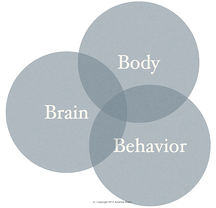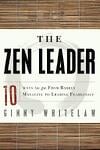Amanda Blake is a FEBI-Certied Coach who is doing some amazing work around the Science of Somatics. I recently caught up with Amanda about her work with leaders, her forthcoming book and how she utilizes the FEBI patterns in her work.
 Tell me about Stonewater Leadership.
Tell me about Stonewater Leadership.
I started Stonewater to support social change by helping people become more deeply embodied. New research is revealing - and yogis and martial artists have been telling us for generations - that as you increase self-awareness in physical, emotional, and mental domains all kinds of benefits open up, from increased health to reduced stress to greater empathy.
In my line of work as a Master Somatic Coach I primarily apply those insights to the challenges of leadership. When done right, cultivating mindful embodiment can have practical leadership benefits as well as personal benefits.
Through Stonewater I work with two groups of people: practitioners who want to learn more about the science of embodiment, and leaders - primarily social entrepreneurs - who want to increase their capacity to lead during these challenging and turbulent times.
What can we expect in your forthcoming book, Your Body Is Your Brain?
The big promise behind the book is that it will help people get smarter about what matters to them by harnessing their full intelligence, including the wisdom of the body. Your Body Is Your Brain surveys the research landscape in a wide variety of fields - biopsychology, embodied cognition, neuroscience, and psychoneuroimmunology, to name a few - and connects that research to powerful and compelling stories of change told by somatic coaching clients worldwide.
In the book, I explore how leaders can cultivate the social and emotional intelligence they need to effectively galvanize people around their vision, manage their mood when the going gets tough, handle conflict when it arises, and so on. Most importantly, I explore why it’s imperative - really, truly non-optional - to include the physical body in any kind of personal development. There are sound neurobiological reasons why this is so, and in the book I explore those reasons.
During a recent FEBI Certified Coach webinar, you discussed how subtle changes in body posture can induce powerful changes in ourselves and those around us. Can you speak more to this phenomenon?
Sure. Dr. Stephen Porges, a prominent researcher focused on the autonomic nervous system - a part of our nervous system involved in stress and relaxation - collaborated with bodyworkers to study the effects of Rolfing on stress. They found that changing the angle of the pelvic bowl from a slight anterior tilt to a more balanced position was associated with a sustained increase in parasympathetic tone. What this means, in lay terms, is that people experienced a greater sense of calm when their hips were in a healthier and more efficient anatomical position. This is because the parasympathetic nerves involved in calming physio logical systems run right through your pelvic bowl. Your everyday posture actually plays a role in your resilience to stress.
logical systems run right through your pelvic bowl. Your everyday posture actually plays a role in your resilience to stress.
So what does this have to do with leadership and organizations? What I and other somatic coaches consistently see in our clients is that as they make sustained postural changes, several things shift in conjunction with that, including their typical mood, their sense of confidence, and their capacity to take actions that were previously difficult for them. This can include speaking up in meetings, or modulating their flashes of anger, for example. This claim that posture impacts more than just physiological health is supported by Amy Cuddy’s research on power postures at Harvard Business School, which I mentioned during the webinar.
How are you utilizing FEBI in your work? How do the patterns connect with your work?
Obviously, FEBI is a great fit with my work. Most of my work is about helping people learn how to be in their body in a new way so they can take different actions. FEBI is the only instrument I know of that goes beyond increasing self-awareness to help people actually move differently in the world, both literally and metaphorically. For this reason, it’s the only leadership assessment that I use.
I often play a little game with myself: I tend to guess at people’s FEBI profiles by watching them move, and then when I have a look at their FEBI results, I check how close I was. This has really helped me hone my ability to see how clients’ behavior and personality shows up in their gestures and comportment. Sometimes I teach in programs that don’t include use of the FEBI. In those circumstances I’ll still observe participants through the lens of the patterns and help them access new options and actions through other qualities of movement. Overall, I have found the FEBI to be a really helpful tool.
I should also add that I have written about the patterns in Your Body Is Your Brain and I refer to them as well in my Body = Brain practitioners class. I interviewed Betsy Wetzig, Ginny Whitelaw's co-author on Moving to Greatness, to get a deeper understanding of how she came to her understanding of the patterns. And several FEBI coaching clients have been generous with their time and stories as well. Many thanks to all of the wonderful folks at Focus Leadership for supporting the effort!


